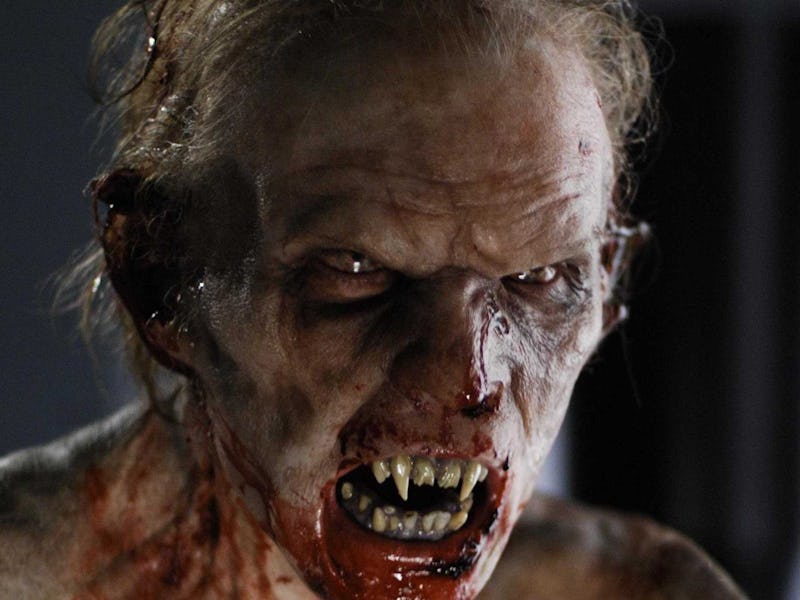Looking for Some Vampire Slaughter This Halloween? A Bizarre Dystopian Thriller Has You Covered
Sure, vampires are deadly and all, but the real threat is vampire capitalism.

The predominant trope of the vampire genre is the sheer imbalance between the human and vampire populace, where a few undead lurk among the living, eager to blend in. While the motivations for passing off as human might differ — some thrive on the thrill of the hunt, while others wish to quietly co-exist — vampires have always held the minority status as the other. What happens when this convention is flipped on its head? That’s what directors Peter and Michael Spierig explore in the sleekly unconventional Daybreakers, set in a dystopian future where humans are systematically hunted by a world populated almost exclusively by vampires.
How this inverted ratio comes about feels a tad eerie today. A plague begun by a lone infected vampire bat, dubbed the Outbreak, mutates the human gene and turns the populace into blood-hungry beasts, the conversion taking hold rapidly as the infection spreads. Ten years later, human-blood farming is a profitable business for industrial conglomerates, including pharmaceutical companies like Bromley Marks, where humans are bled dry for commercial distribution. With the remaining humans on the verge of being wiped out, the vampires now have to contend with a worldwide blood supply shortage, a unique problem in a uniquely morbid dystopia.
The tone set by Daybreakers is gloomy from the start, as the film opens with a child vampire (or, to be exact, a vampire in a child’s body) willingly walking into the sun after becoming disillusioned with her transformation. We cut to an urban metropolis drenched in dismal, metallic shades of gray, where its undead inhabitants are seen adjusting to their new reality of scarcity and crisis while their fangs glisten under the moonlight.
These fissures in an already crumbling socio-economic system are easy to parse. A new class of blood-deprived vampires known as subsiders has emerged due to a new mutation, one characterized by violent outbursts and acute psychosis. Already pushed to the edge by crisis, the vampire state intends to wipe out this new underclass while grappling with the possibility of a blood substitute. This is where conflicted hematologist Edward Dalton (Ethan Hawke) comes into play, as the blood expert has been tasked with perfecting a synthetic substitute before it’s too late.
Daybreakers consciously works within the confines of a sci-fi mold. The vampire outbreak is more of a health crisis than a mystical phenomenon, and conglomerates quickly capitalize on it for unimaginable profits. A whole new capitalist superstructure is built from scratch as the humans start dwindling, with products like daylight-safe cars and walkways advertised to cater to a new way of existence. You can even get human blood infused into your morning coffee. This is a cruel, cutthroat world devoid of moral restraint or genuine empathy, as epitomized by Charles Bromley (a delightfully sinister Sam Neill), the ruthless owner of Bromley Marks, who’s willing to commit deplorable acts just to facilitate a profit margin.
Daybreakers features plenty of intriguing sci-fi visuals... but there’s some good, old-fashioned vampire hunting, too.
In stark contrast, the film’s heart, Dalton, roots us into a sentiment that’s surprisingly humane and touching. Dalton was turned against his will and spends his immortal days feeling conflicted, his empathy towards humans sticking out like a sore thumb in a world that feasts on mortal prey. After running into a group of humans, including a no-nonsense survivalist named Elvis (Willem Dafoe), Dalton finds himself gravitating towards the idea of a “cure” that could potentially rid the world of its current predicament while offering hope for a fresh start. The Spierigs package this thoughtful, measured message about the human zeal for survival in stylish action sequences soaked in ample gore, where comeuppance is meted out in the form of torn limbs and decapitated heads.
Daybreakers wastes no time biting into its hyper-futuristic core, where it deftly exposes the hydraheads of vampire-centered capitalism that takes greed and consumption to another level. There’s no space for Gothic romanticism in a world characterized by stark, sanitized corporate spaces trying to hide the rot at their center, and vampires like Dalton emerge as a liability the moment they betray the system.
Through Dalton, we peek into the spirit of human perseverance, and the notion that being human is as much a moralistic choice as a DNA-determined condition. Thankfully, the treatment of these themes never feels didactic, as Daybreakers cruises smoothly through its viscerally riveting frames towards a sunrise that feels welcome, and earned. By the end of Daybreakers, the world loses more than it had bargained for, but we’re left with the hope of basking under a new dawn, unfettered by the confines of our intrinsic natures.
Daybreakers is streaming on Prime Video.
This article was originally published on